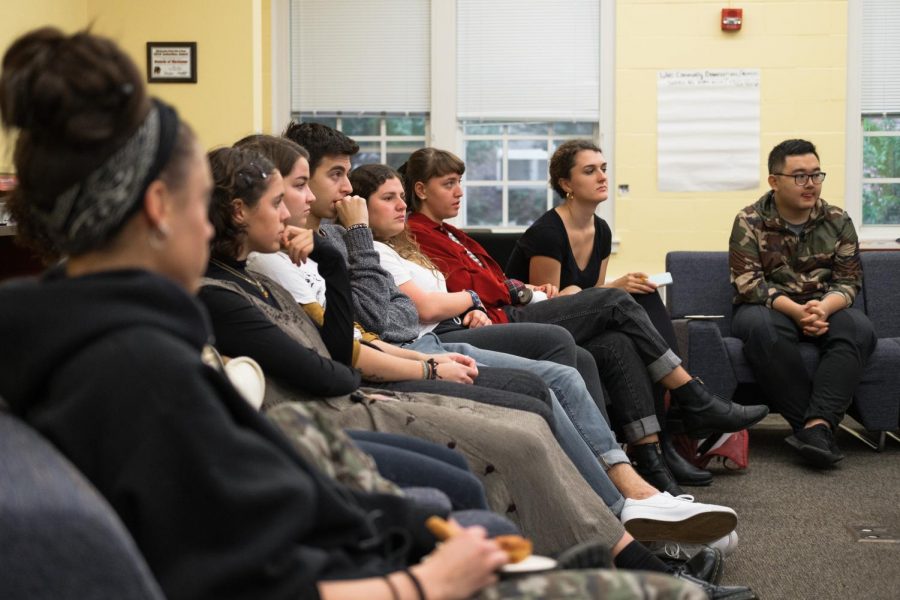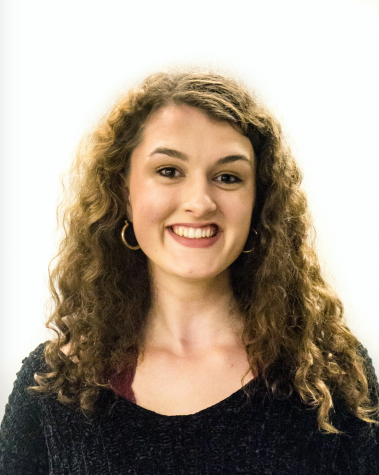New student group “Building Bridges” talks incarceration and restorative justice
September 19, 2019
As the sun set last Friday evening, students gathered in the Sounds of Blackness lounge to join new student organization Building Bridges for its first event. Co-chairs Ashley Collins Trube ’22 and Maggie Kohl ’22 founded Building Bridges as a group focused on de-incarceration and practicing restorative justice.
“I’ve been interested in incarceration and restorative justice for a while. It’s something that I really want to learn more about, and it’s something that affects a lot of people in our community,” Kohl said at the start of the event.
After introductions, Trube discussed the importance of vulnerability in conversations about criminal justice.“A big piece of restorative justice is not just leveling with the people around you, but being a vulnerable listener,” Trube said. “That means actively listening, but more importantly, it means understanding that the people we’re speaking to aren’t the perfect advocates for the issues we’re talking about, and if you decide to become an advocate in any field, understand that because other people come from different experiences than you, there will still be things that you’re learning in your professional career.”
Trube is well versed on the impact of incarceration. Her passion for the issue blossomed in high school, leading her to internships at organizations like Children for Incarcerated Caregivers and the University of Minnesota Law School’s Immigrant and Refugee Clinic.
At Macalester, Trube often meets and connects with students interested in incarceration. This year, she started an organization to awareness to the issue.
“I think in-person community brainstorming is a really effective way to find organizations to connect with and people in the community,” Trube said. “I may just be one person who has an experience with two organizations in the city, but when you get 15 students in the same room together who are all really passionate about different areas of incarceration, then we’re able to have a lot more impact.”
Kohl and Trube are not alone in their mission. Building Bridges is commanded by an executive committee — Fatiya Kedir ’21, Briah Cooley ’21 and Ian Doyle Olson ’20, who serve as junior advisor, community organizer and secretary respectively.
After Trube’s introduction, Olson took the floor as a student speaker.
“The incarceration system has sort of landed on my family in a couple ways both personally and professionally, and has also affected me both personally and professionally,” Olson said.
Olson spoke about his experience coping with mental illness and the criminalization of mental illness. In his eyes, Macalester students could be more compassionate when discussing the impacts of the justice system.
“As soon as I had my two brief rides through being very manic and psychotic and ending up in jail or in state psych wards … [and] I got back here, I realized that everyone [at Macalester] kind of sucks as it relates specifically to the criminal justice system,” Olson said.
“At Macalester it’s hard to even communicate to other people in the English language how unforgiving they or their attitudes are to the people just on the other side of the curb,” he continued, citing instances of students glaring and taking photos of homeless people on or around campus.
Olson likened the harsh treatment to the way the college approaches students who are facing severe mental illness.
“There are posters everywhere that say ‘Myth, if you’re suicidal Macalester will make you leave, fact, we’re here to help you with everything,’” Olson said. “That’s not a fact. Macalester will kick you out with glee, with skill and with some of the most compassionate waiting room voices you have ever heard.”
The Office of Student Affairs makes all involuntary leave decisions.
“The Involuntary Leave Policy is about how the College may respond to a student that demonstrates developing and/or continuing behavior which is determined to be a threat (i.e. inflict pain, injury, damage, or other hostile action) to themselves or another member of the Macalester community,” Assistant Vice President and Dean of Students DeMethra LaSha Bradley wrote in an email to The Mac Weekly.
“The policy is enacted very sparingly and only in cases that are deemed to warrant it,” she continued. “The policy is in place to support the safety and well-being of individual students and the greater community. It is meant to be supportive and educational, not punitive.”
At this first event, Trube, Kohl and the executive committee invited Metropolitan State University associate professor of Law Enforcement & Criminal Justice and Urban Education Raj Setharaju. He encouraged students to venture beyond the confines of academia and to find opportunities in the Twin Cities to advocate for restorative justice in support of people affected by the criminal justice system.
“We want to invite you to be change-agents, not just simply book-agents,” Setharaju said. “There is a place for [academia]. But I am done with reading more books about criminal justice. Right? I described in my description that I sent to [Assistant Dean of College Access, Retention, and Success] Sedric [McClure] that I am a recovering criminologist because these damn theories…that’s not the work. It doesn’t work. It doesn’t work for folks like us.
“We are not just saddled to academia,” he continued. “Academia is not producing change agents.”
Trube agreed. “At several points throughout the summer, I found myself… in a room full of really passionate leaders who have been impacted by incarceration and want to get something done but the only way they have been able to make an impact thus far is through academic means, through research,” Trube said. “Something I wanted and I know a lot of other people want is action that goes farther than research, like actually making change in the community.”
Trube hopes that academia and community organizing will come together in the upcoming International Roundtable, titled “Incarceration (Un)Interrupted: Reclaiming Bodies, Lands, and Communities” which she believes will spark discussion about restorative justice.
“When this International Roundtable is over, we don’t want people to go back to their normal lives or go into research and that’s all they do and that’s all the impact they have,” she said. “We want to find ways where we can do real work and see our impact in the community.”
Over the next few months, Building Bridges hopes to collaborate on community projects with similar student groups at the University of Minnesota–Twin Cities and Carleton College, such as a mural for a visitor waiting room in a state correctional facility.
Building Bridges’s next event is a showing of the new Netflix original series “When They See Us” on Saturday, Sept. 28 in the Sounds of Blackness Lounge from 6 to 9 p.m.














